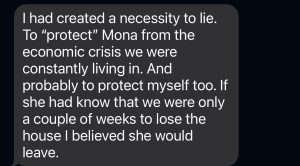Rewrite This Like a Human: A Workbook for the Chronically Confused, Emotionally Constipated, and Occasionally Sincere
(Subtitled: “The Language of Grown-Ups Who Have Stopped Auditioning for Martyrdom.”)



Lesson One: “I Did Not Think It Mattered”
Original:
“There were a lot of small ones, but I didn’t think they mattered.”
Why it is a problem:
Because when you “do not think” something matters to the other person, you are deciding on their behalf without listening to them. And that is not humility. That is arrogance with a dash of denial.
Rewrite like a human:
“Looking back, I minimised things that affected you. I did not take the time to understand why they mattered to you, and I am sorry for treating your feelings like footnotes.”
Lesson Two: “She Lied Too”
Original:
“But she told me her lies as well.”
Why it is a problem:
Ah, yes. The UNO Reverse of accountability. This is like handing someone a bandage while you are still stabbing them and saying, “Well, you breathed too hard once, sooo…”
Rewrite like a human:
“I used her flaws to avoid looking at my own. That was not fair. I am responsible for my choices, regardless of what she did.”
Lesson Three: “We Were No Good to Each Other”
Original:
“We were no good to each other.”
Why it is a problem:
It is a generic break-up blanket that hides all the knives underneath. You were no good to her because of your actions. Whether she was or was not “good” to you is a separate matter—and not a pass for hurting someone else.
Rewrite like a human:
“The way I treated her was harmful. Maybe the relationship was not good for either of us—but I need to own my part in that, not gloss over it.”
Lesson Four: “She Was Talking to Another Dude”
Original:
“I should have broken up with her when I found out she was chatting with this other dude…”
Why it is a problem:
This is classic “I am the real victim” sleight-of-mouth. It avoids reflection and centres its narrative on someone else’s perceived wrongdoing.
Rewrite like a human:
“I ignored red flags, whether real or imagined, and stayed in the relationship anyway. That choice led to more pain, and I am responsible for that.”
Bonus Exercise: “Emotional Accountability Mad Libs”
“I said/did __________, and even though I did not intend to hurt you, I recognise that it caused ________. I now understand that my behaviour came from ___________, but that does not excuse it. I am taking responsibility by ____________, and I hope I can rebuild some trust by _____________.”

